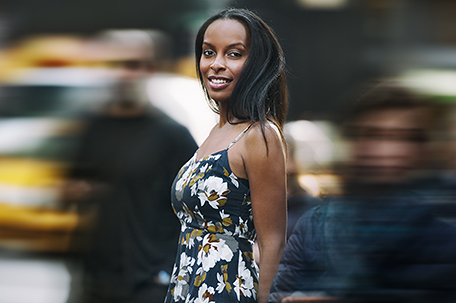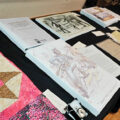

Ajeenah Ross
By Ajeenah Ross
“The media is the most powerful entity on earth. They have the power to make the guilty innocent and that’s power. Because they control the minds of the masses.” -Malcolm X.
African American women are bombarded by images in the media that tell them they are not beautiful and are worthless. At a certain age, young women of African American descent start to believe they will never be considered as beautiful as that pretty, White, blonde-haired, blue-eyed princess on television or that shapely video vixen flaunted in music videos. In the end, many believe they must conform to those images in order to be accepted.
When women hear song lyrics such as “All I want for my birthday is a big booty ho” by Juicy J, the demeaning lyrics further the ideology that a black woman’s worth is tied to her body. The words suggests that if a black woman’s “butt” (or behind) is not big enough to satisfy a man then she is worthless. Such lyrics contribute to women getting plastic surgery in order to please a man. Ultimately, women may develop negative thoughts about their self-image, overtime, when exposed to such misogyny in the media.
The trend prompted me to undertake the topic for my high school research project, which is entitled: “In what ways does misogyny in the media contribute to the negative self-image amongst some African American women?” The overriding issues for me was “How can we mitigate misogyny in the media to improve the respect for women and girls?” In effort to answer this question, I decided to complete a five-week internship to assist me with my research at The Philadelphia Sunday SUN, an African American-owned, weekly newspaper that serves Philadelphia and its surrounding counties.
I learned that the devaluation of American Black women can be traced to slavery. Dr. bell hooks, in her book “Ain’t I a Woman?: Black Women in Feminism,” points out the “Degradation of Black womanhood after slavery was a conscious efforts on the part of Whites to sabotage the mounting black female self-confidence.” hooks also noted that a subset of the behavior was to demean black men in the process. “Black men were forced to watch their wives get raped by white men…Many people have difficulty appreciating black women as we are because of eagerness to impose a identity upon us based on any number of negative stereotypes,” she explained.
Fast forward, today Black men and women participate in the disrespect, mistreatment, and negative stereotypes and perceptions of Black women. The misogynistic songs that are played on the radio, displayed in magazines and billboards ads, videos, movies, and television shows act as a catalyst in this epidemic.
In 2013, Essence Magazine surveyed 1,200 women about the images of Black women in the media. The survey results indicated that respondents believed the images were ‘overwhelmingly negative,’ falling typically into categories including: ‘Gold Diggers, Modern Jezebels, Baby Mamas, Uneducated Sisters, Ratchet Women, Angry Black Women, Mean Black Girls, Unhealthy Black Women, and Black Barbie (Dolls).’ The report concluded that the images of Black women in the media, while largely negative, relegate Black women to classifications that will not disintegrate or reveal and foster positive Black female images.
Due to the growing success and popularity of music videos, many young African American women are aspiring to be cast in this medium as performers and dancers. Those who perform in this entertainment industry genre have become known as video vixens, with characteristics that include being women of color or of a mixed-race. They perform scantily clad or strip totally. It is not often that White women appear in such videos and therefore are not considered video vixens. Why are White women not considered video vixens? The response, in my estimation, would only add to the speculation that Black women are cast negatively as immoral, sexual objects, not worthy of respect.
Because of the growing success and popularity of video vixens such as Buffie the Body and Ki Toy Johnson, many young Black women aspire to become video vixens. Many are even willing to take drastic measures to achieve the goal. This can involve wearing less clothes during a video shoot or partaking in certain “duties” that have sexual undertones, in order to get in a video.
In an effort to stand out and be noticed in the entertainment industry, some women also reconstruct their bodies. Some pay the cost of permanent physical and emotional damage and even death. One young lady, in particular, Claudia Aderomiti, a British student with hopes of becoming a hip-hop video star, flew from England to Philadelphia to undergo an illegal butt enhancement, performed at a local hotel. After being dropped from music videos for wearing bottom padded trousers, Aderomiti thought the procedure would help her career. Unfortunately, she died due to complications during the procedure, which was performed by an unlicensed medical professional.
As I interviewed Leah Fletcher, an Advertising Executive at the SUN, she shared several sentiments that resonated with me. “Women have a major role to play in correcting the negative images used to portray them,” Fletcher said, while advising women to take back the power to control the images used to define them.
During our interview, Fletcher related a story about a scantily dressed Black woman that she observed walking past a construction site in downtown Philadelphia. The construction workers were making bird calls and directing sexually obscene comments toward the young woman. One construction worker, who also happened to be Black, said, “Come here and let me tap that behind.” To which, the young woman responded, “I ain’t no ho’.” (The term “ho” is commonly regarded as an abbreviation for the word whore). The construction worker then replied, “I can’t tell, if you are wearing the uniform.”
The scene demonstrates that as African American women we must teach people how to treat us, by modeling the essence of our humanity in our behavior through our thoughts, words and deeds. Therefore, it is important that we actively create messages that communicate informed-awareness and demand respect and we should boycott those that relegate us to a status of inferiority.
















Leave a Comment